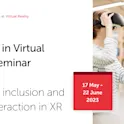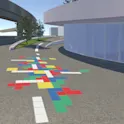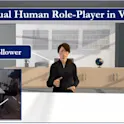Colorful urban environments, even if just in virtual reality, promote wellbeing
By Conn Hasting, science writer Colorful virtual reality cityscape. Image credit: A. Batistatou, F. Vandeville, and Y.N. Delevoye-Turrell Urban environments can be drab and stressful, but introducing vegetation or colorful designs could improve the wellbeing of city dwellers. A new study investigated the potential of these simple interventions using a virtual reality simulation. It found that green vegetation was pleasurable for volunteers, whereas colorful designs increased curiosity and fascination. The virtual methods could be useful for urban planners in testing new methods to improve wellbeing. Drab urban environments tend to increase our stress, whereas nature can soothe the soul, but how do you get the best of both? One option is to increase color and vegetation in cities, but finding the best approach can be tricky. A new study in Frontiers in Virtual Reality tested the effects of vegetation and colorful patterns in an urban environment. Employing virtual reality, the study found that green vegetation caused volunteers to walk more slowly, while also increasing their heartrate, indicating a pleasurable experience. Meanwhile, colorful patterns increased alertness, fascination and curiosity. The study illustrates the potential of simple interventions to improve the lives of urbanites, and also the power of virtual reality […]









